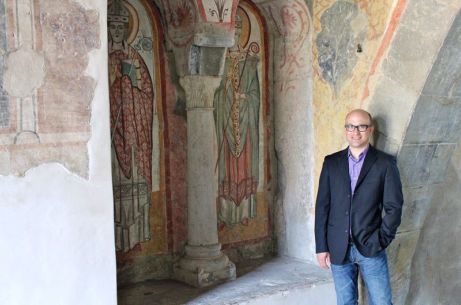
Daniel DiCenso discovers a missing link showing how Gregorian chant spread across Europe.
A Gates Cambridge alumnus has discovered an overlooked medieval manuscript – a missing historical link – that answers some old questions and raises many new questions about how Gregorian chant spread from Rome to the rest of Europe in the eighth and ninth centuries.
Daniel DiCenso [2005] discovered that a manuscript he had travelled to Monza in Italy to research as part of his PhD in Music at the University of Cambridge had been wrongly catalogued as a 10th or 11th century source of Gregorian chant. He says before his research very little was known about the manuscript, but the description in the catalogue did not seem to tally with the date given.
“When I arrived in Monza I was shocked to discover that the manuscript actually might date back to as early as 850 AD,” he says.
Although early sources of Gregorian chant survive in France, Belgium and Switzerland, it was previously thought that none had survived in Italy. He says the manuscript he studied is likely to be one of the three earliest sources of Gregorian chant in existence, the only source of its type and the earliest source to contain a complete chant formulary for the famous Requiem Mass, the inspiration for works by Mozart and Verdi.
Daniel, assistant professor of music at the College of the Holy Cross in the US, will present his research at the Pontifical Institute for Sacred Music in Rome on Sunday as part of a conference session sponsored by the Cantus Planus study group of the International Musicological Society.
The Institute was founded in 1910 to teach the history, theory and practice of liturgical music and to promote its dissemination.
Daniel’s research is described as “ground-breaking” by a colleague at Holy Cross. It forms part of his PhD thesis on the earliest sources of Gregorian chant. “If I hadn’t pursued my studies at Cambridge and if my thesis supervisor, Professor Susan Rankin, hadn’t pushed me to work with primary sources, I never would have stumbled upon the Monza manuscript,” said Daniel. He is currently editing a book containing all of the existing sources of Gregorian chant for the Mass up to the end of the ninth century, which he says would be “a significant scholarly advancement in the field”.
Daniel was recently awarded the Robert L. Ardizzone (’63) Junior Faculty Research Award by Holy Cross.
Photo credit: Nathan Fitch.












